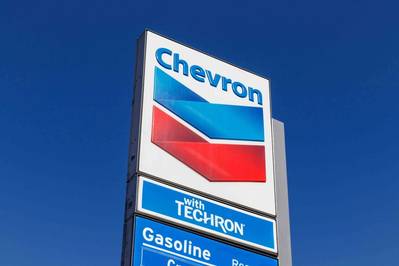US Halves Chevron Exports of Venezuelan Oil
U.S. oil major Chevron is only able to export about half the crude its joint ventures produce in Venezuela with the latest rules laid out by Washington, three sources close to the matter said.
The Treasury Department in late July issued a restricted authorization allowing Chevron to operate in the sanctioned country and export oil to the U.S., but it banned payments in any currency to the government of President Nicolas Maduro.
To comply with the permit, the joint ventures where the Houston-based company participates have been paying royalties and taxes with oil in kind, effectively reducing what Chevron can export to about 50% of the 240,000 barrels per day of crude the projects produce, the sources said.
Chevron's partner, state oil company PDVSA, is in control of the barrels delivered to comply with the in-kind payments, using them either for domestic refining or export, they added.
The latest rules - which have not been made public - represent a significant departure from a previous license granted to Chevron under former President Joe Biden in 2022, which allowed the company to export all of its output from the country and pay taxes and royalties to Venezuela with cash.
On a practical level, the new authorization means that less of the heavy, high-sulfur crude produced in Venezuela will reach the U.S. Gulf Coast, the sources added.
PDVSA and Venezuela's oil ministry did not reply to requests for comment. Senior U.S. officials have said in recent months Washington would not allow Maduro's government to profit from the sale of oil.
Chevron said it conducts its business globally in compliance with applicable laws and regulations, as well as the U.S. sanctions frameworks, including in Venezuela.
The previous payment structure had allowed Chevron to see a substantial reduction in the debt Venezuela owes the company from more than $3 billion in 2022, according to separate sources at both companies.
With a limited volume of oil for exports under the new arrangement, the pace of repayment has slowed. The company is also dealing with restrictions affecting its joint ventures' operational and capital expenses, the people added.
In August, Chevron resumed exports of Venezuelan oil to the U.S. after a 4-month pause, shipping some 60,000 bpd that month. So far in September, it has exported an average of 102,000 bpd, according to vessel monitoring data.
Chevron CEO Mike Wirth said last month that exportable volume under the new terms would be limited, but did not disclose figures.
(Reuters)






